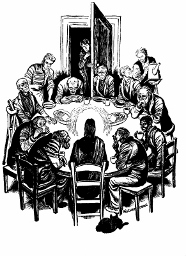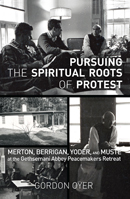We are Each Other’s Bread and Wine
no. 5
 by Rev. Joanna Harader
by Rev. Joanna Harader
Peace Mennonite Church
Lawrence, Kansas, August 3, 2008
I invite you to dig into your memories and imaginations. Envision the table. It’s a big table, with all the leaves put in. The table is covered by Aunt Betty’s table cloth that doesn’t quite reach the ends. There are lots of chairs around the table—six nice wooden ones, a few wobbly chairs brought up from the basement, a couple of metal folding chairs, and, of course, the piano bench where the two smallest have to sit and share the curved end of the table.
It’s supposed to be a nice meal. The food is good. There is an air of celebration. Things are going well. Grandpa says, “Amen.” You say, “Please pass the Jello salad.” But then Uncle Herman says, “Can you believe those anti-family kooks up in Massachusetts, letting gay people get married?” And your cousin Frank, who is still in the closet, looks intently at his mashed potatoes. Continue reading “Tension at the table”

